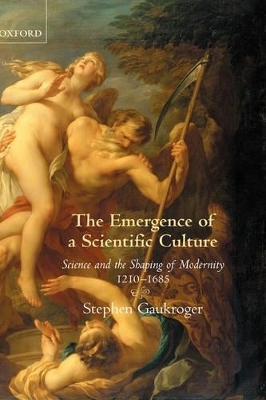
The Emergence of a Scientific Culture
Science and the Shaping of Modernity 1210-1685
Seiten
2006
Oxford University Press (Verlag)
978-0-19-929644-6 (ISBN)
Oxford University Press (Verlag)
978-0-19-929644-6 (ISBN)
Shows that science was bitterly contested during the early modern period. Rejecting the traditional picture of secularization, this work argues that science in the seventeenth century emerged not in opposition to religion but rather was in many respects driven by it.
Why did science emerge in the West and how did scientific values come to be regarded as the yardstick for all other forms of knowledge? Stephen Gaukroger shows just how bitterly the cognitive and cultural standing of science was contested in its early development. Rejecting the traditional picture of secularization, he argues that science in the seventeenth century emerged not in opposition to religion but rather was in many respects driven by it. Moreover, science did not present a unified picture of nature but was an unstable field of different, often locally successful but just as often incompatible, programmes. To complicate matters, much depended on attempts to reshape the persona of the natural philosopher, and distinctive new notions of objectivity and impartiality were imported into natural philosophy, changing its character radically by redefining the qualities of its practitioners.
The West's sense of itself, its relation to its past, and its sense of its future, have been profoundly altered since the seventeenth century, as cognitive values generally have gradually come to be shaped around scientific ones. Science has not merely brought a new set of such values to the task of understanding the world and our place in it, but rather has completely transformed the task, redefining the goals of enquiry. This distinctive feature of the development of a scientific culture in the West marks it out from other scientifically productive cultures. In The Emergence of a Scientific Culture, Stephen Gaukroger offers a detailed and comprehensive account of the formative stages of this development---and one which challenges the received wisdom that science was seen to be self-evidently the correct path to knowledge and that the benefits of science were immediately obvious to the disinterested observer.
Why did science emerge in the West and how did scientific values come to be regarded as the yardstick for all other forms of knowledge? Stephen Gaukroger shows just how bitterly the cognitive and cultural standing of science was contested in its early development. Rejecting the traditional picture of secularization, he argues that science in the seventeenth century emerged not in opposition to religion but rather was in many respects driven by it. Moreover, science did not present a unified picture of nature but was an unstable field of different, often locally successful but just as often incompatible, programmes. To complicate matters, much depended on attempts to reshape the persona of the natural philosopher, and distinctive new notions of objectivity and impartiality were imported into natural philosophy, changing its character radically by redefining the qualities of its practitioners.
The West's sense of itself, its relation to its past, and its sense of its future, have been profoundly altered since the seventeenth century, as cognitive values generally have gradually come to be shaped around scientific ones. Science has not merely brought a new set of such values to the task of understanding the world and our place in it, but rather has completely transformed the task, redefining the goals of enquiry. This distinctive feature of the development of a scientific culture in the West marks it out from other scientifically productive cultures. In The Emergence of a Scientific Culture, Stephen Gaukroger offers a detailed and comprehensive account of the formative stages of this development---and one which challenges the received wisdom that science was seen to be self-evidently the correct path to knowledge and that the benefits of science were immediately obvious to the disinterested observer.
Stephen Gaukroger has a BA (Philosophy) from the University of London and a Ph.D (History and Philosophy of Science) from the University of Cambridge. He was Research Fellow in the Philosophy of Science, Clare Hall, Cambridge, 1977-1978; Research Fellow, Department of History and Philosophy of Science, University of Melbourne, 1978-1980. Since 1981 he has been in the Philosophy Department at the University of Sydney where he is currently Professor of History of Philosophy and History of Science.
PART I ; PART II ; PART III ; PART IV ; PART V
| Erscheint lt. Verlag | 1.1.2007 |
|---|---|
| Reihe/Serie | Science and the Shaping of Modernity |
| Zusatzinfo | 1 table, numerous black and white illustrations, numerous line drawings |
| Verlagsort | Oxford |
| Sprache | englisch |
| Maße | 160 x 240 mm |
| Gewicht | 1011 g |
| Themenwelt | Geschichte ► Teilgebiete der Geschichte ► Religionsgeschichte |
| Geisteswissenschaften ► Philosophie ► Philosophie des Mittelalters | |
| Geisteswissenschaften ► Religion / Theologie | |
| Naturwissenschaften | |
| ISBN-10 | 0-19-929644-8 / 0199296448 |
| ISBN-13 | 978-0-19-929644-6 / 9780199296446 |
| Zustand | Neuware |
| Haben Sie eine Frage zum Produkt? |
Mehr entdecken
aus dem Bereich
aus dem Bereich
Herkunft, Blüte, Weg nach Osten
Buch | Hardcover (2024)
C.H.Beck (Verlag)
CHF 55,90
Von den Anfängen bis zur Gegenwart
Buch | Hardcover (2022)
C.H.Beck (Verlag)
CHF 47,60
warum die Religionen erst im Mittelalter entstanden sind
Buch | Hardcover (2024)
C.H.Beck (Verlag)
CHF 53,20


